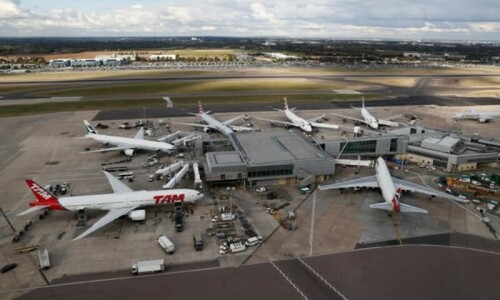EVEN Covid-19 has failed to take attention away from the ongoing political stand-off in Afghanistan. The intensity of the Afghan political crisis is so great that the power stakeholders in the conflict have been unable to prioritise the coronavirus health emergency and appear more concerned about their political future.
Since the US and the Afghan Taliban signed a peace deal on Feb 29, the political transition in Afghanistan has witnessed surprising developments. For instance, the Taliban have been showing flexibility in their position on the prisoners’ issue. Dr Abdullah Abdullah, the self-proclaimed ‘winner’ of the last election, has also changed his political strategy and sent clear signals of reconciliation to President Ashraf Ghani. However, President Ghani is in an aggressive mood and appears all set to start his second term by coming down hard on his political opponents. He was never happy with the deal and is now getting more assertive even with the US, which could result in further reduction of US financial aid to Afghanistan.
Afghanistan is among the countries with the least testing facilities, but the virus appears to be spreading. As of April 16, the public health ministry confirmed 840 confirmed cases, with at least 30 associated deaths. A failure to control the spread of the virus can also expedite the withdrawal process of the US and Nato forces. Former US ambassador Richard Olson recently predicted that if the coronavirus hit Afghanistan hard, it could accelerate the exit of US troops. Such a situation will increase US dependence on the Taliban to reduce the violence and prevent foreign terrorists from operating from their soil, as per the insurgents’ commitment. However, both commitments will test the Taliban, which still have a significant operational capacity and are, at least ideologically and politically, in line with groups like Al Qaeda.
So far, the Taliban have shown restraint in targeting foreign forces in Afghanistan. However, they are still resorting to violence against the Afghan security forces, apparently to keep their political advantage intact. Their attacks increased considerably a week or so after they signed the deal. According to an Afghan media outlet, the Taliban carried out 2,162 attacks against government forces following the end of their reduction-in-violence week, which started on Feb 22. During the week mentioned, the number of attacks plummeted from an average of 70 to 15 per day; however, since Feb 29, the Taliban have conducted 31 to 96 attacks on Afghan forces per day. At the same time, the Taliban are complaining to the US negotiation team about the operational strikes against Taliban fighters in their homes, which they believe violate the provisions of the agreement.
Afghanistan’s focus is not on the growing number of coronavirus cases.
The prisoners’ swap is still complicated even though the government has released a few hundred Taliban detainees, and, in return, the Taliban have freed dozens of Afghan security personnel. For Kabul, the prisoners’ issue is meant to keep its leverage over the Taliban intact. For the Taliban, this is a test of America’s ability to fulfil its promises; it is also a condition for initiating a broader dialogue with Kabul. The US does not want to break the deal, which is why on the one hand it is pushing Kabul hard, and on the other, expecting Pakistan to use its influence over the Taliban. The US believes that Pakistan is a crucial partner and can still do more by influencing the Taliban to cooperate in a US exit, which is expected to be completed in 14 months, and become part of the intra-Afghan reconciliation process. Recently, American envoy Zalmay Khalilzad and Gen Austin Miller who commands the US and Nato forces in Afghanistan, visited Islamabad and held talks with army chief Gen Qamar Bajwa, and renewed their commitment to a political solution to the conflict.
Afghan officials and media adopted a harsh tone against Pakistan after the attack on a Sikh gurdwara in Kabul by the militant Islamic State group. Afghan intelligence arrested IS commander Aslam Farooqi. Afghanistan vice president and former intelligence chief Amrullah Saleh accused Pakistan of supporting the IS, and tweeted that the capture of the IS leader would prove to be a ‘treasure of intelligence’ on Pakistan. All this irritated Pakistan, which demanded that Farooqi, who belongs to Orakzai district, be handed over. It was also reported that Aslam Farooqi was not arrested but himself surrendered to Afghan intelligence. Since Afghanistan declared victory against the IS last November, the Afghan media has been continuously reporting surrenders of IS fighters, including those from Afghanistan, Pakistan and the Central Asian states. It is to be ascertained as to what extent IS has been weakened but the Taliban captured their areas of influence in Kunar province recently, which they used as proof of their commitment to the US to prevent foreign terrorist groups from using Afghan soil. It appears that both the Taliban and Kabul are targeting the IS to please the US, but blaming Pakistan will only complicate the situation.
In a fast-changing political scenario, with President Ghani in aggressive mode, Dr Abdullah is consolidating his political capital by adopting a reconciliatory posture. After President Ghani’s refusal to offer him the slot of chief executive, Dr Abdullah has floated a new proposal, which includes a 50 per cent share in the cabinet, and appointing governors in the provinces where he has won a higher number of votes. However, most importantly, he is demanding a considerable role in the peace process. A prominent position in the peace process will bring him closer to the US, Nato, Pakistan and all other concerned regional actors. Much depends on President Ghani’s response. The failure to reconcile will increase frustration in Washington which has already threatened to withhold $1 billion in aid to Afghanistan this year.
The UN has warned that the spread of the pandemic could cause a global humanitarian disaster and has appealed for a global ceasefire in all conflict zones. Ironically, internal and external power stakeholders in Afghanistan are not ready to shift their priorities. This is not a season of optimism.
The writer is a security analyst.
Published in Dawn, April 19th, 2020













































